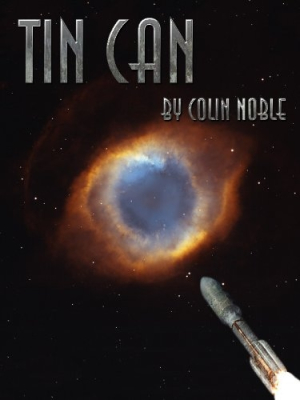Tin Can
Tin Can, Colin Noble’s debut novel, rolls along as jauntily as its titular ship, introducing young readers to a fun and exciting futuristic world. Think Star Trek, but with kids in charge.
In 2048, the Edwards family—father Dave, mom Lucy, teenager Jacob, young Billy, and a genetically engineered ring-tailed lemur named Quincy—leaves the ravaged planet Earth in a spacecraft to seek a new home for humans on Jupiter’s moon Europa. The Edwards soon discover that Space Command, the government entity tracking the ship’s trajectory, never expected the voyagers to survive. Undeterred, the Edwards guide their tin can of a spaceship toward their goal while navigating through obstacles thrust upon them by other humans and by outer space.
Along with the human characters, even the ship’s temperamental computer possesses a personality. The relationship between Billy and Jacob is portrayed with a realistic mixture of rivalry and friendship. Much is made of Billy’s grotesque disfigurement, and his family suspects he is mentally impaired because of his appearance, with only Quincy knowing the true vastness of the boy’s intellect.
While it is heartening to see the love Dave, Lucy, and Jacob have for Billy, because of his looks, it is even more refreshing that Billy has the opportunity to prove himself early in the story. It is rare and wonderful to read a novel where a child with a disability gets to be heroic many times throughout the journey of the narrative.
The heroics of both boys can sometimes be problematic, though, because their maturity fluctuates with the needs of the plot; one minute, they act like boys readers can relate to, and the next they pontificate and display the maturity of seasoned pilots. When tragedy occurs, the brothers recover at a disconcerting speed, given the magnitude of the event. These blips in characterization, however, are easily glossed over because readers will become engrossed in the fascinating detail with which Noble describes the ship as well as the friends and foes the Edwards encounter.
Space Command is a well-thought-out, believable entity, and its dealings with a faction called the Anarchists creates fascinating conflict while simultaneously presenting government in a way that makes readers think while being entertained. Noble introduces all of his science-fiction concepts in such a matter-of-fact way that the audience never doubts his veracity. And, the fact that Noble’s book is set in 2048 makes this story a cautionary tale. The author never lets readers forget that the Edwards are out in space because Earth’s climate change has rendered the planet uninhabitable.
With its compelling themes and intriguing characters, young-adult readers will want to explore outer space with Tin Can.
Reviewed by
Jill Allen
Disclosure: This article is not an endorsement, but a review. The publisher of this book provided free copies of the book and paid a small fee to have their book reviewed by a professional reviewer. Foreword Reviews and Clarion Reviews make no guarantee that the publisher will receive a positive review. Foreword Magazine, Inc. is disclosing this in accordance with the Federal Trade Commission’s 16 CFR, Part 255.

